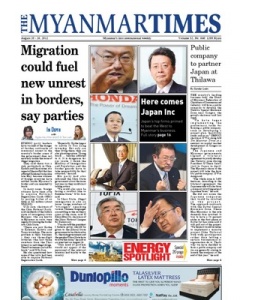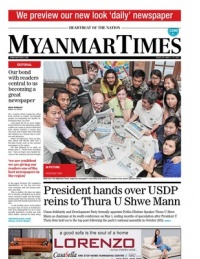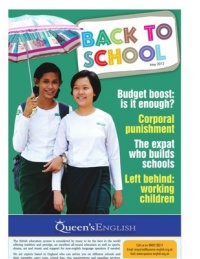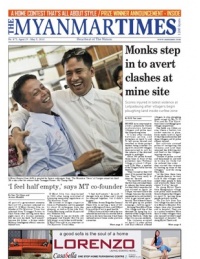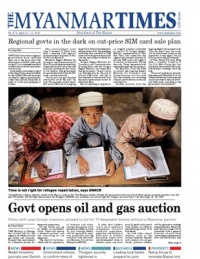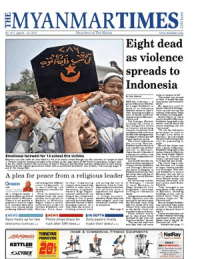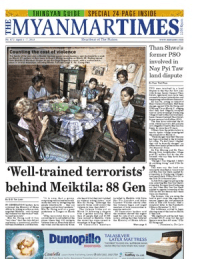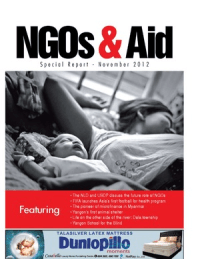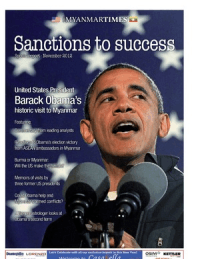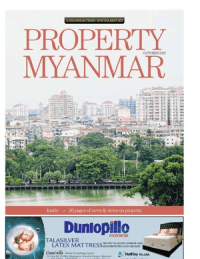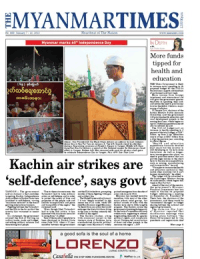myanmar
times
t H e
August 20 - 26, 2012
Myanmar’s first international weekly Volume 32, No. 640 1200 Kyats
Here comes Japan Inc
Japan’s top rms primedto beat the West toMyanmar’s business.Full story
page 16
.
By Sandar Lwin
THE country’s leadingbusiness body, the Unionof Myanmar Federation of Chambers of Commerce andIndustry, will form a publiccompany to develop theThilawa Special EconomicZone near Yangon, thegroup’s chairman said lastweek.“We have beganimplementing thepreliminary tasks forforming a public company,such as developing aproject plan, feasibilitystudy and so on,” UMFCCIchairman U Win Aung told
The Myanmar Times
at aseminar on capital marketdevelopment in Yangon on August 13.The Japanese andMyanmar governmentssigned a bilateralagreement to jointly developthe Thilawa zone duringPresident U Thein Sein’svisit to Japan in April.The Myanmar share in theproject will take the formof a public company, U Win Aung said.“The whole zone is 2400hectares. According to thebilateral agreement, theJapanese side will also forma company involving severalJapanese firms,” he said.He did not name theJapanese companiesthat would be involvedin the project.The approach contrastswith the Dawei SpecialEconomic Zone, whereMax Myanmar is the soledomestic firm involved. Itwas to have a 25 percentstake in the first phase atDawei but has since said itwill pull out of the project.“We think it would be betterto implement a massiveproject [like Thilawa]with wide participationrather than letting acertain businessman ororganisation do it. That’swhy we have decided toform a public company andwe are generally aiming tolaunch the company at theend of this year,” he said.
Publiccompanyto partnerJapan atThilawa
More page 4More page 4
ETHNIC party leadershave warned of the dangerof further outbreaks of communal unrest in thecountry’s border areas if the government does notseriously tackle the issue of illegal migration.They said there was arisk, particularly in Chin,Kachin and Shan states, of arepeat of the conflict that hasafflicted Rakhine State sincelate May because citizensof foreign countries havesettled inside Myanmar’sborder and are resented bylocals.In many cases, foreigncitizens have been ableto acquire NationalRegistration Cards (NRC)by paying bribes of aslittle as K1 million (aboutUS$1150).U Zo Zam, chairman of the Chin National Party,said residents of the Indianstate of insurgency-rivenManipur, who are knownin Myanmar as
kathe
, wereregularly crossing the borderinto Chin State.“There are now Kathein Kalemyo, Kalewa andTamu townships. The mainproblem is their business– they run three-digitlotteries (the last threenumbers from the Thailottery) or sell illegal drugs.These businesses are bad forlocals,” said U Zo Zam.He also questioned howsome of the
kathe
had beenable to acquire NationalRegistration Cards.“Especially, Kathe beganto settle in Ton Zangtownship. Not only arethey living there, they arealso planting opium. Younglocals … become addictedto it. It is dangerous forour youth. I think theMinistry of Immigrationand Population and theborder guards have totake responsibility for thatsituation,” he said.His party had alsoinformed the Chin Stategovernment about the issuelast year so they could starttaking action.“We could also soon befacing a conflict like inRakhine State,” U Zo Zamsaid.In Shan State, illegalimmigration is also anissue. Large numbers of “strangers” speakingvarious Chinese languagesare settling in the northernareas of the state, said UKhun Htun Oo, chairman of the Shan National Leaguefor Democracy.“I’ve also told the presidentI believe power should begiven to the [Shan] Stategovernment to be able to solveit – the state government andthe people of Shan State haveto solve this issue,” he said inan interview on August 15.“This kind of problemwould not appear if thepersonnel of the relevantministry had loyalty to thecountry.
Migrationcould fuelnew unrestin borders,say parties
I
n
D
epth
with
Kyaw Hsu Mon and Ei Ei Toe Lwin
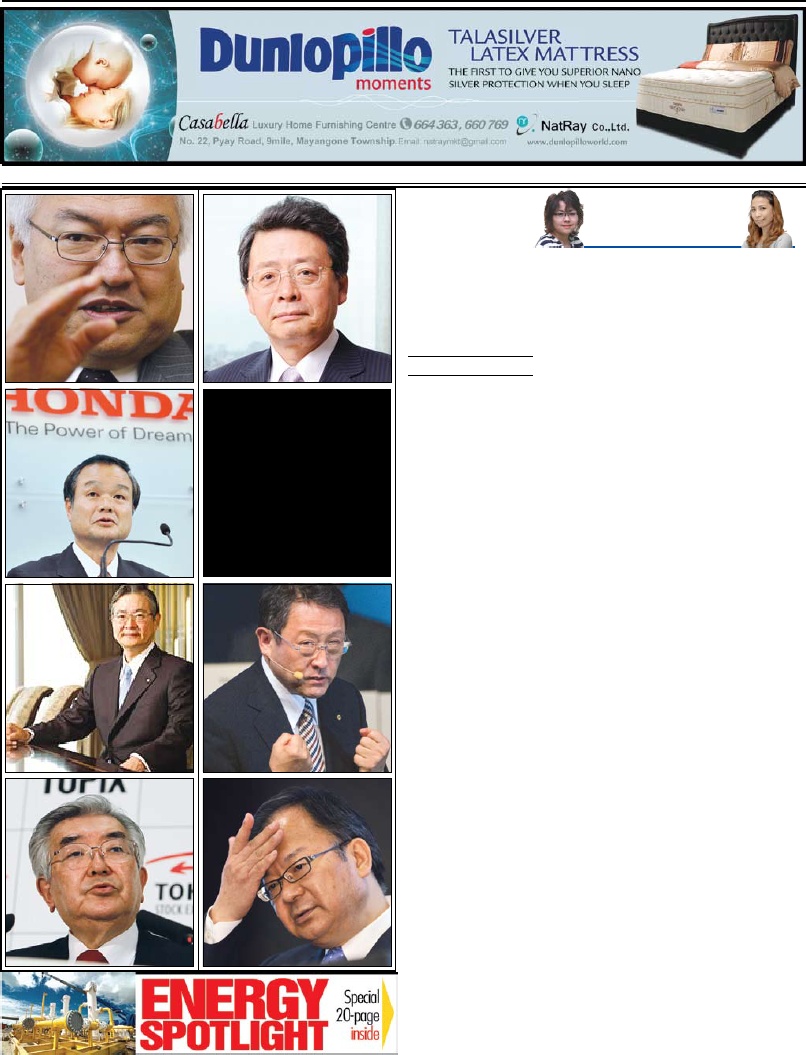




C
omment
the
M
yanMar
t
iMes
2
August 20 - 26, 2012
IF you remember CyndiLauper or Daryl Hannahor Mary Lou Retton,then you’ll probably alsoremember Zola Budd.She was the barefootedSouth African distancerunner who broke worldrecords in 1984 and then wassecretly offered £100,000 by
The Daily Mail
to move tothe United Kingdom.The British authoritiesco-conspired in thisskulduggery because theywanted the teenager torun in that summer’s Los Angeles Olympic Gamesand win a gold medal forthem.So they fast-tracked herimmigration entry, andunlike most poor sods whohave to wait years, she wasgiven British citizenship in just 17 days.Promptly included inthe Olympic squad, she jetted off to LA where, inan infamous incident, sheand the American worldchampion, Mary Decker,collided in the 3000 metresfinal and Decker fell to theground.Budd was so mortified atcausing her idol to crashout of the race that shedeliberately slowed downand finished out of themedals.Most Brits and manyothers thought it waspoetic justice and therewere teeth-gnashing storiesin the press lambastingthe government over thissordid affair.Curiously, a very similarsequence of events hashappened over the pastfortnight in relation tothe Chinese table tennisplayers who have just wonmedals for Singapore at theLondon Olympics.The three young women,Feng Tianwei, Li Jiawei andWang Yuegu, were all bornin China and were spottedby Singaporean scoutsand enticed to emigrateunder the country’s ForeignSports Talent Scheme.Feng, the most gifted of the trio, was persuaded tomove in March 2007, andin an eerie echo of Budd,was chosen to representSingapore just threemonths later.Then, along with herChina-born compatriotsLi and Wang, who hadalso been given fast-trackSingapore citizenship, shewon silver in the team eventat the 2008 Olympics.Last week, the trio hadto settle for bronze in thesame event, while Fengalso won bronze in thewomen’s singles – the firstindividual table tennismedal any “Singaporean”has ever won. All well and good, exceptthat a media storm haserupted in the island state,not only because the girlsbecame citizens virtuallyovernight, but becauseof all the dosh they werepaid. You see, a second scheme,the Multi-Million Dollar Awards Program, wasused to lure them to giveup their own nationalityand become instant mockSingaporeans.Under this programme,if they won an individualOlympic gold medal they’dget S$1 million. A silverwould get them half a million and a bronze$250,000; a team eventbronze gets $375,000.Thus far, 25-year-oldFeng’s payout from theSingapore governmentamounts to $625,000 – plus,of course, a new passport.But hey, what’s theproblem? The girl workedhard and deserves everycent she’s reaped. So whyare all these Singaporeancouch potatoes bitching?Well, among other things,they’re angry that Fengwas Singapore’s flag-bearerat the opening ceremonyin London – surely, theylament, a native-borncitizen could have beengiven that honour.It is pathetic, and frankly,racist. If they dislike thegovernment’s policy of paying talented foreigners,nearly all Chinese, tobecome Singaporeans, thenthey know what to do at thenext election. Meanwhile,shut up.But no, not only do theywhine that the lucre-induced influx of foreignathletic opportunistscarries a sour Budd-liketaste, but they also claimit stunts the developmentof native-born talent.They are probably right,but this is cold Singaporeefficiency. Why spend yearsgrooming local athleteswhen you can let anothercountry do all the workand then buy them over attheir peak? As Prime Minister LeeHsien Loong said earlierthis month: “We welcomeforeigners so they canstrengthen our teamand we can reduce ourconstraints.”It’s clinical, dispassionate,and it brilliantly self-mocks the nauseating andover-hyped nationalisticfervour that plagues manycountries.
Despite uproar, businessas usual in Singapore
Olympic bronze medal-winning table tennis player FengTianwei, who was born in China but was persuaded totake up Singaporean citizenship in 2007.
Pic: AFP
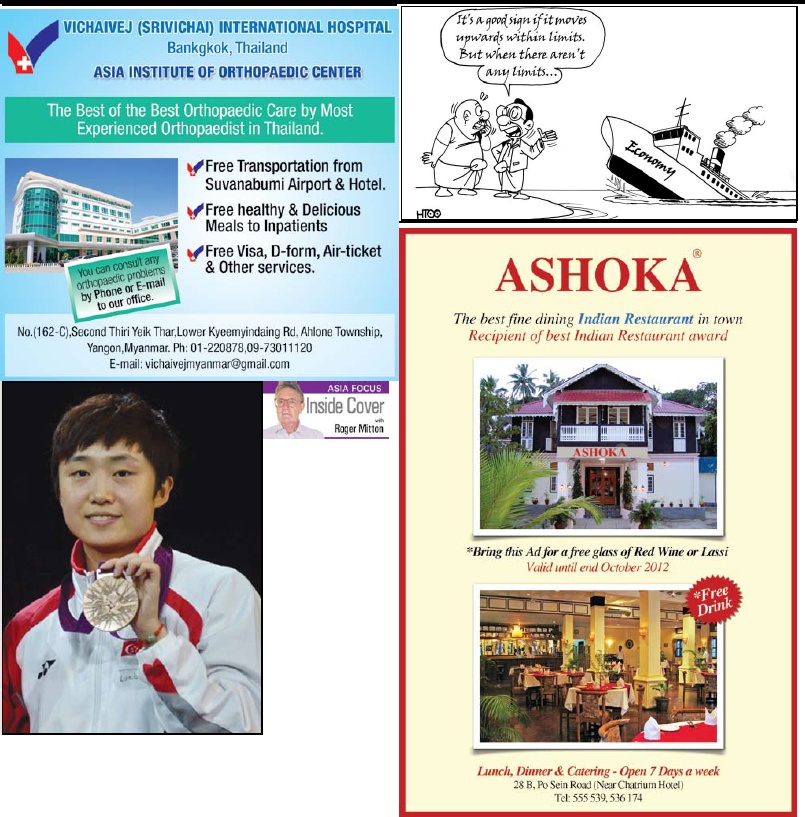





n
ews
3
the
M
yanMar
t
iMes
August 20 - 26, 2012
By Aye Sapay Phyu
A DEPARTMENT of Meteorologyand Hydrology official last weekattributed the unusually heavymid-monsoon in Myanmar’s deltaand coastal areas to the effects of climate change.The official described the 2012monsoon as “extreme” – lowerMyanmar has received above-average rain, while falls in thecentral areas have been sparse– and said rainfall patterns hadbeen significantly different thanthe 30-year average from 1961to 1990.“Myanmar averaged rainfallfrom one inch to three inches aday in the mid-monsoon seasonof July and August over that 30-year period. That regular monsoondistribution was advantageous forsectors such as agriculture andtransportation. But we observedthat in the last 10 years, dailyrainfall in the mid-monsoonhas increased to five or even sixinches,” he said.“Since the end of July, we havemeasured five to seven inches of daily rainfall in some areas of lower Myanmar. Over the past 10years, there have also been dayswhere we measured no rain in themid-monsoon season.“Either extreme – excessiverain or not enough rain – is aproblem for the agriculture sector.Excess rain results in flooding inthe paddy fields and on roads.This impacts on the economy andsociety more broadly.”While some parts of the country,particularly Ayeyarwady andBago regions and Kayin State,have experienced flooding thisyear, the central areas are indrought, he said.He attributed the flooding toeffects of an unusually intenselow-pressure area in the Bay of Bengal in early of August.“Low pressure areas in thenorthern area of the Bay of Bengalnormally cause strong wind andheavy rain within 300 miles, toabout Thandwe in Rakhine state.But the impact of this low pressurearea reached about 600 miles andcaused the Ayeyarwady deltaarea to also experience extremeweather. Flooding in these areaswas at its worst in early August,during the high tide period,” hesaid. An official from the MyanmarRed Cross Society said on August13 that more than 10,000 peoplehad been forced to leave theirhomes because of flooding in theBago Region townships of ShweKyin, Waw, Madauk, Daik Ooand Kawa.Meanwhile, an official of the FireService Department for Patheintownship in Ayeyarwady Regionsaid that about five quarters inPathein were flooded last weekand some of the town’s schoolsforced to close as a result.“There are seven relief camps inPathein. … We are still countingthe exact number of people in thecamps. Water has been increasingsince full moon day of Waso [on August 2]. The water is morethan three feet high in some low-lying quarters,” he said on August16. “The high water level of theNgawun River combined withcontinuous heavy rain caused theflooding, which normally happensin Pathein every four years orso.”DMH reported on August 15 thatthe Ngawun River exceeded itsdanger level of 350 centimetres atPathein by 15cm on August 16.He said that all parts of Ayeyarwady Region, with theexception of Pyapon, Maubinand Myaungmya township, hadreported flooding.Daw Wint Mon, who visited Yangon from Pathein on August14, said flooding on the Yangon-Pathein Road was worst near DarKa township.“Water level was about theheight of an adult’s knee at threepoints on the Yangon-PatheinRoad. The edge of the road wasmarked with flags for the safetyof the cars,” she said.The department has forecastanother low pressure system couldintensify into a depression in theBay of Bengal in late August.
Climate change behind ‘extreme’ monsoon weather: DMH
By Soe Than Lynnwith
AFP
THE Pyidaungsu Hluttawlast week appointed 58-year-old navy chief AdmiralNyan Tun as the newvice president, replacinghardliner Thiha Thura UTin Aung Myint Oo in amove seen as strengtheninggovernment reformers. Admiral Nyan Tun, 58,who has a reputation asa political moderate, wasselected by the appointeddefence services personnelwho hold 166 seats – 25percent of the total – in thenational legislature.“I will carry out myresponsibilities honourablyto the best of my abilityand strive for the furtherdevelopment of the eternalprinciples of justice, libertyand equality,” AdmiralNyan Tun said in his oathof office on August 15.His appointment wasapproved by a selectionboard that vetted hiscredentials, PyidaungsuHluttaw Speaker Khin Aung Myint announced ata joint session of the lowerand upper houses in Nay PyiTaw the same day.“He’s very quiet and knownas a flexible man,” a militaryparliamentarian, who didnot want to be named, said of the new vice president. “Hehas three children and livesa simple life.”His predecessor, ThihaThura U Tin Aung Myint Ooresigned in July, ostensiblydue to ill health, aftermonths of speculation overhis future.The army’s first candidateto replace him, YangonChief Minister U Myint Swe,failed eligibility criteria inthe constitution because hisson-in-law is an Australiancitizen, a parliamentarysource told
AFP
.“The Yangon chief minister is not qualified tobe a vice president becauseof his Australian son-in-law.Military representativeschanged the nominationin the last week of July to Admiral Nyan Tun,” thesource said.The same constitutionalprovision is a barrier toNational League forDemocracy leader Daw Aung San Suu Kyi takinga top leadership role in thecountry.Under Myanmar’spresidential electoralcollege system, electedrepresentatives in theupper house, electedrepresentatives in thelower house and militarypersonnel from both housesall select one presidentialcandidate. A vote is held toselect the president from thethree nominees, with theother two candidates takingon the vice presidentialroles.If one of the three is forcedto leave office, the groupthat selected him or her astheir nominee chooses thereplacement.
Navy chief sworn inas vice president
A woman washes clothes on the bank of the Ayeyarwady River in Mandalay last week.By Phyo Wai Kyaw and Hlaing Kyaw Soe
THE level of the Ayeyarwady River atMandalay receded in the first two weeks of August but an official in the city said thesituation needed to be closely monitoreduntil October.“The water level went down to 1051centimetres on August 14 from 1226cmon July 31,” said U Win Hlaing Than fromWater Guard Office 3 in Chanayetharzantownship.“But we still need to watch the situationuntil the middle of October, as the waterlevel often increases again in Septemberand October,” he said.The river normally reaches its annualpeak between July and October as a resultof heavy rains in catchment areas furtherupstream. In July 2004 the water levelreached 1382cm, its highest point in 30years. The river stayed above its dangerlevel of 1260cm for 17 days and dykes hadto be established along the bank besideStrand Road.
Official urges caution on river level
Pic: Phyo Wai Kyaw
Admiral Nyan Tun gets nod ater U Myint Swe ineligible





検索履歴:
結果00中00
00結果次の結果
p.
